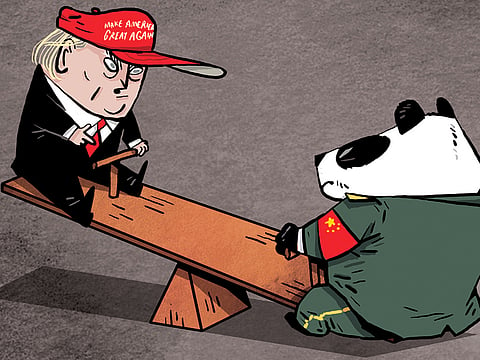America and China approaching a new Cold War
What started out as trade war has transformed into a technology war over global dominance

Also In This Package
“We are in the foothills of a Cold War”, Henry Kissinger told me last year. It had seemed obvious to me since early last year that a new Cold War — between the US and China — had begun.
What had started out in early 2018 as a trade war over tariffs and intellectual property theft had by the end of the year metamorphosed into a technology war over the global dominance of the Chinese company Huawei Technologies Co. in 5G network telecommunications; an escalation of old frictions over Taiwan and the South China Sea.
How did relations between Beijing and Washington sour so quickly that even Kissinger now speaks of Cold War?
Not only are we already in the foothills of that new Cold War; those foothills are also impenetrably covered in a dark forest of China’s devisingNiall Ferguson
The conventional answer to that question is that President Donald Trump has swung like a wrecking ball into the “liberal international order” and that Cold War II is only one of the adverse consequences of his “America First” strategy.
Economic corollary
When Middle America voted for Trump four years ago, it was partly a backlash against the asymmetric payoffs of engagement and its economic corollary, globalisation.
The Covid-19 pandemic has done more than intensify Cold War II. It has revealed its existence to those who last year doubted it.
Also Read: Is US-China tension fuelling new Cold War?
Also Read: Why Trump is playing the China card
Also Read: Is US ceding space to China?
Yet now China wants to claim the credit for saving the world from the crisis. Liberally exporting cheap ventilators, testing kits and face masks, the Chinese government has sought to snatch victory from the jaws of a defeat it inflicted.
The deputy director of the Chinese Foreign Ministry’s information department has gone so far as to endorse a conspiracy theory that the coronavirus originated in the US and retweet an article claiming that an American team had brought the virus with them when they participated in the World Military Games in Wuhan last October.
Just as implausible are Chinese claims that the US is somehow behind the recurrent waves of pro-democracy protest in Hong Kong. The current confrontation over the former British colony’s status is unambiguously Made in China.
As Mike Pompeo has said, the new National Security Law Beijing imposed on Hong Kong last Tuesday effectively “destroys” the territory’s semi-autonomy and tears up the 1984 Sino-British joint declaration, which guaranteed that Hong Kong would retain its own legal system for 50 years after its handover to People’s Republic in 1997.
Genuine bipartisan consensus
It is not really surprising that American public sentiment towards China has become markedly more hawkish since 2017, especially among older voters. China is one of few subjects these days about which there is a genuine bipartisan consensus.
It is a sign of the times that Democratic presidential candidate Joe Biden’s campaign clearly intends to portray their man as more hawkish on China than Trump. (Former National Security Adviser John Bolton’s new memoir is grist to their mill.) On Hong Kong, Nancy Pelosi, the Democratic speaker of the House, is every bit as indignant as Pompeo.
“The establishment of a productive and predictable US/China relationship,” wrote John Lipsky, formerly of the International Monetary Fund, “is a sine qua non for strengthening the institutions of global governance.”
The last Cold War had cast a “shadow of a global holocaust for decades,” observed James Steinberg, a former deputy secretary of state. “What can be done to create a context to limit the rivalry and create space for cooperation?”
Yan Xuetong, dean of the Institute of International Relations at Tsinghua, recently argued that Cold War II, unlike Cold War I, will be a purely technological competition, without proxy wars and nuclear brinkmanship.
Yao Yang, dean of the National School of Development at Peking University, was equally candid in an interview with the Beijing Cultural Review, published on April 28.
“To a certain degree we already find ourselves in the situation of a New Cold War,” he said. “There are two basic reasons for this. The first is the need for Western politicians to play the blame game” about the origins of the pandemic.
“The next thing,” he added, “is that now Westerners want to make this into a ‘systems’ question, saying that the reason that China could carry out such drastic control measures [in Hubei province] is because China is not a democratic society, and this is where the power and capacity to do this came from.”
Not only are we already in the foothills of that new Cold War; those foothills are also impenetrably covered in a dark forest of China’s devising.
Niall Ferguson teaches at the Hoover Institution, Stanford University. He was previously a professor of history at Harvard, New York University and Oxford
Bloomberg







